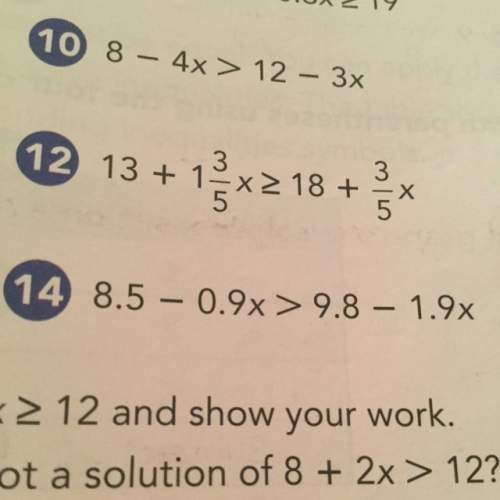
Mathematics, 10.05.2020 08:57, alyssamaize
In a telepathy experiment, the "sender" looks at 1 of 5 Zener cards while the "receiver" guesses the symbol. This is repeated 40 times, and the proportion of correct responses is recorded. Because there are 5 cards, we expect random guesses to be right 20% of the time (1 out of 5) in the long run. So in 40 tries, 8 correct guesses, a proportion of 0.20, is common. But of course there will be variability even when someone is just guessing. Thirteen or more correct in 40 tries, a proportion of 0.325, is statistically significant at the 5% level. When people perform this well on the telepathy test, we conclude their performance is not due to chance and take it as an indication of the ability to read minds.
In a large experiment with 500 people, how many people do we expect to be identified as telepathic even if everyone is just guessing?
a. it is impossible to estimate this
b. 100
c. 25
d. 5

Answers: 2
Other questions on the subject: Mathematics


Mathematics, 21.06.2019 19:30, jessnolonger
Zoey made 5 1/2 cups of trail mix for a camping trip. she wants to divide the trail mix into 3/4 cup servings. a. ten people are going on the trip. can zoey make enough 3/4 cup servings so that each person gets one serving? b. what size would the servings need to be for everyone to have a serving?
Answers: 1

Mathematics, 21.06.2019 23:30, liaholmes8
Walking at a constant rate of 8 kilometers per hour, juan can cross a bridge in 6 minutes. what is the length of the bridge in meters?
Answers: 1

Mathematics, 22.06.2019 00:00, brandon1748
Ascientist studied a population of workers to determine whether verbal praise and/or tangible rewards affect employee productivity. in the study, some workers were offered verbal praise, some were offered tangible rewards (gift cards, presents, and some were offered neither. the productivity of each participant was measured throughout the study by recording the number of daily tasks completed by each employee. which inference might the scientists make based on the given information? a.) the number of daily tasks completed by each employee may influence the dependent variable, which is whether the employee receives verbal praise, tangible rewards, or neither. b.) verbal praise and/or tangible rewards may influence the independent variable, which is the number of daily tasks completed by each employee. c.) verbal praise and/or tangible rewards may influence the dependent variable, which is the number of daily tasks completed by each employee. d.) the dependent variables, which are verbal praise and tangible rewards, may influence the number of daily tasks completed by each employee.
Answers: 1
Do you know the correct answer?
In a telepathy experiment, the "sender" looks at 1 of 5 Zener cards while the "receiver" guesses the...
Questions in other subjects:


Computers and Technology, 04.09.2020 03:01

History, 04.09.2020 03:01

Mathematics, 04.09.2020 03:01

Mathematics, 04.09.2020 03:01

Mathematics, 04.09.2020 03:01


Mathematics, 04.09.2020 03:01


Social Studies, 04.09.2020 03:01







